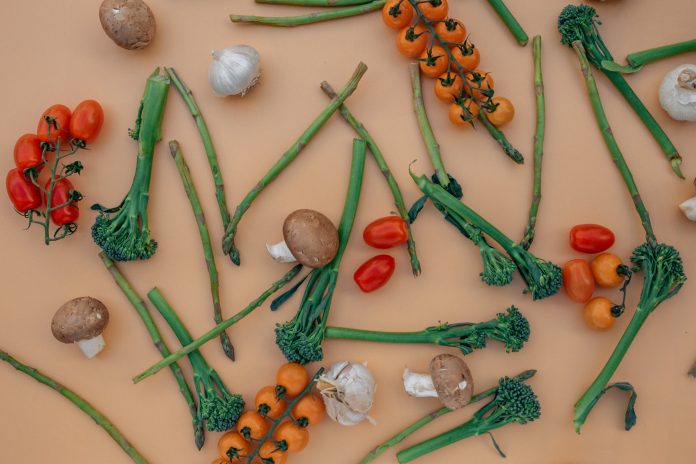A plant-based diet is well-known for its health benefits. It can reduce the risk of inflammation, arthritis pain, bad cholesterol levels, Type 2 diabetes, heart disease, cognitive impairment and dementia, and certain cancers.
Another important benefit of a plant-based diet is weight loss and management. However, it’s still possible to gain weight with this diet due to certain food choices, food preparation methods, eating habits, and lifestyles. Check them out here.
Prepping/Cooking Food Unhealthily
Despite opting for whole fresh fruits and vegetables, they can still result in weight gain if prepared or cooked in the wrong way. Note that many essential nutrients can get denatured at high temperatures.
Here are some nutrients that are often reduced during cooking:
- Water-soluble vitamins (e.g., vitamin C and the B vitamins)
- Fat-soluble vitamins (e.g., vitamins A, D, E, and K)
- Minerals (e.g., calcium, magnesium, potassium, and sodium)
One of these cooking methods that should be avoided is frying or deep-frying. Besides losing nutrients, the oil used for frying can spike cholesterol levels and could lead to weight gain. The same goes when frying any fresh fruit or vegetable.
To preserve nutrients and maximize weight loss benefits, remember to reduce the following:
- The amount of water used in cooking
- Cooking time
- The surface area of the food that’s exposed
For nutrient preservation, the following cooking methods are the least destructive:
- Waterless cooking
- Pressure cooking
- Steaming
- Stir-frying
- Microwaving
In addition, here are more tips on how to prepare a plant-based diet healthily and ensure weight loss:
- Add a pinch or no salt.
- Put less dressing in salads.
- Steaming vegetables is the healthiest, and blanching is the second.
- Stir-fry or saute instead of boiling to preserve more nutrients.
- For dishes that require high heat, it’s healthier to grill and bake/roast them instead of frying.
- Opt for cooking spray instead of butter and oil to reduce calories.
- Avoid overheating oil, which can cause free radicals that can damage cells.
- Avoid overcooking.
Reading more about preparing or cooking a plant-based diet can significantly help you in your weight-loss journey. There are several online platforms like BuzzRx Updates and even mobile apps that you can tap on these days. Learning them may be challenging and time-consuming, but everything will be easy and fast once you’re used to it.
Opting for Processed Vegan-Friendly Food
Not all products labeled as “vegan-friendly” are nutrient-dense. Such products include processed and fried plant-based foods. They lack “real” nutrients and contain additives, including refined carbs and hidden sugars.
These processed plant-based products are often opted for by many busy people. They thought they were great since they were “plant-based” and had a longer shelf life. However, these are purely misconceptions.
As mentioned, these products often have excess salt, sugar, and unhealthy fats, which help them last longer. However, these extra preservatives can result in weight gain because they can mess with our hormones and cause us to overeat.
The same goes for packaged or canned fruit juices or fizzy drinks. While they may be vegan-friendly, they still have additives, such as sugar or aspartame and artificial colors, that aren’t good for one’s weight loss goals.
The problem nowadays is that most products we consume contain “some” preservatives. Experts claim it’ll be unrealistic to eliminate them from our diet altogether. Instead, to ensure weight loss, they recommend minimizing the intake of them and doing the following:
- Aim for fresh food as the majority of our diet.
- Opt for cold or freshly pressed drinks.
- Scour farmer’s markets for preservative-free food.
- Opt for no added sugar or salt drinks when eating out.
- Avoid mocktails since they’re usually made of flavored sugar syrup.
Dietitians also warned that going organic is good but not always completely chemical-free. Be sure to opt for organic whole foods that use natural preservatives, such as lemon juice, vinegar, and rosemary extracts.
Starve Yourself
Cutting back on calories is generally good for weight loss. However, if done incorrectly, it can put your body in starvation mode, where many essential body functions used to burn calories, such as thyroid, metabolism, and blood pressure, are slowed down.
The consequence of this supposed to be weight loss method is, ironically, weight gain. During starvation or famine, our body turns everything into fat, which leads to fat accumulation that can cause weight gain.
Fill yourself up with low-fat and fiber-rich vegetables and fruits to ensure healthy weight loss. These include lettuce, cabbage, celery, okra, radishes, asparagus, carrots, broccoli, fennel, zucchini, turnip greens, collard greens, spinach, starfruits, and raspberries.
Final Thoughts
A plant-based diet should be whole foods and well-balanced to prompt healthy weight loss. Alongside a low-fat and fiber-rich vegan diet, one should also stay hydrated, sleep well, and exercise regularly to lose weight effectively. If you’re still not losing weight after doing all of these, it’s highly recommended to see a doctor for underlying conditions.
Image from Pexels by Viktoria Slowikowska
Any Web sites linked from Medical News Bulletin site are created by organizations outside of Medical News Bulletin and are the sole responsibility of those organizations. These links are strictly provided by Medical News Bulletin as a convenience to you for additional information only. Medical News Bulletin does not approve or endorse the content on any third-party Web sites and is not responsible for the content of linked third-party sites or third-party advertisements, as well as does not make any representations regarding their content or accuracy. Your use of third-party web sites is at your own risk and subject to the terms and conditions of use as per such sites policies. Medical News Bulletin does not provide specific medical advice, diagnosis or treatment and hereby disclaims any assumption of any of the obligations, claims or liabilities..



